Do you have a strange bug problem in your kitchen? Are they little black bugs, less than half an inch long, and scurry everywhere? Those tiny black bugs on your kitchen counter will only worsen if you don’t eradicate them right away. Who doesn’t want to keep their kitchen free of pests? If you have a problem with tiny black bugs on your kitchen counter, I’ve got the solution. But before stomping those bugs away, let’s reveal first why do they love your kitchen. Keep on reading and share your bug stories in the comment section below.
WHY ARE THERE BUGS AND PESTS IN YOUR KITCHEN?
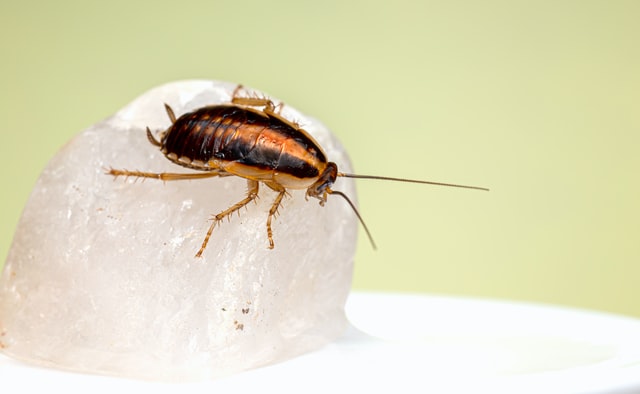
🐜 Exposed / open food container
The most usual reason for a bug infestation is because your foods are exposed. These are the most loved smell, especially the ants. That is why it is crucial always to cover your left food to prevent poisoning,
🐜 Fruits and vegetables
You are undoubtedly familiar with fruit flies. These are pests that are prominent in fruits and vegetables. Fruit flies are generally safe, but you don’t want to see something flying on your food.
🐜 Garbage
Placing your garbage is one of the most crucial kitchen principles you need to remember. Avoid piling up your garbage in the kitchen. Garbages must stay on the outside. And always check your refrigerator and pantry for expired products. Dispose of all expired and rotten food to prevent bugs and pests roam around your kitchen.
🐜 Plants
As mentioned above, garden pests are one of the insects you see on your countertop. Adding plants to your kitchen may seem elegant and add aesthetic design, but you must know how to avoid plant pests from living in your kitchen. Remove all the decaying leaves and do not let the plants stand near the foods because this will attract more bugs.
🐜 Pets
Try to avoid bringing your pets in the kitchen as much as possible. This is to prevent having ticks and other pests from entering your pantry. Preventing your pets from playing in the kitchen will also help eradicate the possibility of having strands of hair and fur in your food.
BUGS AND PESTS ON YOUR KITCHEN COUNTER
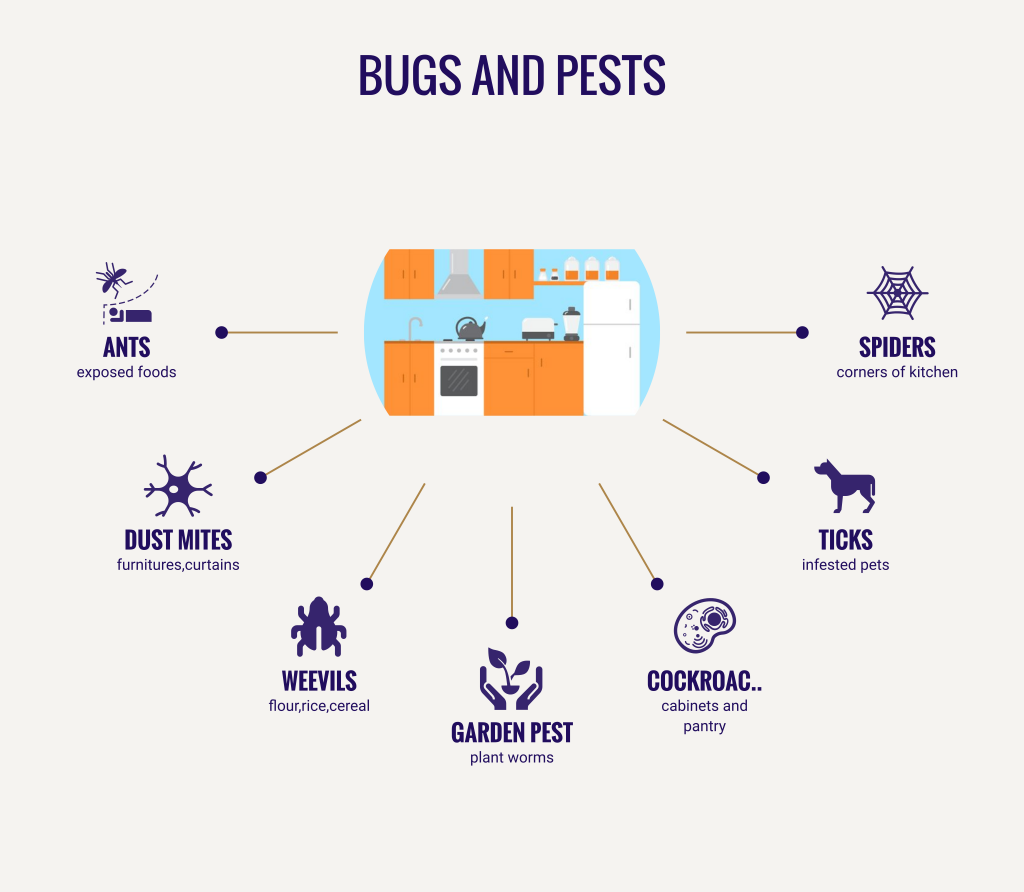
With all the aesthetic designs you integrate into your kitchen, there are still unwanted visitors that will ruin your goal. These are the bugs and pests silently crawling on your kitchen counter. It is important to kill as soon as you notice them, but you need first to know what they are to understand what kind of method you will use.
🐜 Ants
Ants can be so annoying because they suddenly appear nowhere, often seeking into your kitchen. These tiny insects are generally present if there is an open food container or they smell something fragrant that attracts their appetite. We usually neglect the presence of ants, but if not treated immediately, they can create a huge mess.
🐜 Weevils
Weevils are present, especially if you leave cereal, flour, or rice unsealed. These pests love seeds and grains but can also live in your pancake mix. Their larvae live and develop inside your food supplies, and they are not visible until one month after their birth. This is the time when they suddenly appear in your food.
🐜 Garden pests
Some kitchens owners love to place plants on the window or build a garden near the kitchen for easy herb access. But because of this, garden pests can easily crawl to your countertop. Garden pests, such as spider mites and caterpillars, can do a great deal of damage to your kitchen. They can ruin all your effort and hard work in the blink of an eye. Indeed, there are many pesticides available nowadays, but they can render your fruits vegetables inedible if you use them.
🐜 Cockroaches
Cockroaches are not simply disgusting creatures that terrify the spot in your kitchen, but they can also spread severe diseases. These pests don’t feel squeamish about eating any food, including garbage. As a result, if these pests appear in your kitchen, they can bring in gastroenteritis or Salmonella. On top of that, roaches are often the cause of allergies.
🐜 Dust mites
Dust mites are so tiny and it is so difficult to see them with your naked eye. But unfortunately, if you don’t see them, it doesn’t mean they are not around. Dust mites often live in warmer places, and their favorite snack is skin flakes. So this means dust mites are likely to be in your beddings, chair, countertop, or curtains. Though they don’t bite, many believe that they can cause severe allergic reactions and skin irritations.
🐜 Ticks
Ticks are rare in the kitchen, but it is still possible to have them if you do not know proper hygiene. They can be astoundingly different in size and color. Protecting your food, family, and pets from these tiny insects is very challenging. Ticks can spread terrible diseases such as Rocky Mountain spotted fever, Lyme disease, Tularemia, Colorado tick fever, and Ehrlichiosis. Some of these conditions can be fatal, so you must maintain cleanliness in your kitchen area and all over your house, especially where your pets are.
Remember that dogs seem to be easy prey and are often targeted by ticks. Therefore it is better to check your furry friend every time you return from a walk. There is a way to lower the chances of your pet being bitten by doing various natural mixtures of tick repellent.
🐜 Spiders
Even if you don’t have any poisonous spiders roaming around your kitchen, regular spiders can still enter your house and lay eggs everywhere. Usually, spider repellents won’t kill spiders, but they will keep them away due to their strong scent. So if you don’t want to see spider webs on your utensils, it’s better to keep spiders away as early as possible.
HOW TO KEEP PESTS OFF YOUR KITCHEN
Unfortunately, chemical pesticides sold in stores are way too toxic and harmful to be used anywhere in your kitchen. Remember that you need to use natural ways to prevent getting your food from contamination and poisoning. Luckily, there are compelling and harmless ways of getting rid of any insects, especially bugs, that have taken up residence in your kitchen.
🐜 Ants
Ants absolutely hate the smell of cinnamon. That is why it is helpful to place the cinnamon powder on areas where ants are seen. For much more effective results, you can add some drops of essential oil to the cinnamon. This will not only get rid of ants but can also give your kitchen an earthy scent.
But if you are one of those who doesn’t like the smell of cinnamon, you can try white vinegar. This helpful household condiment is strong enough to make the ants go away. Just spray it around the affected area of your kitchen and wait for the ants to crawl back.
🐜 Cockroaches
If you want to get rid of these pests, there are many products you can get from the store, but most of them are usually highly toxic. This can be especially dangerous if you have pets and small kids. Instead, you can use a cheap, effective, and safe method.
Chop an onion and add a teaspoon of baking soda. Put the mixture in every junction of your kitchen and all over your house. Reapply daily, and you’ll instantly find your home free of cockroaches.
🐜 Ticks
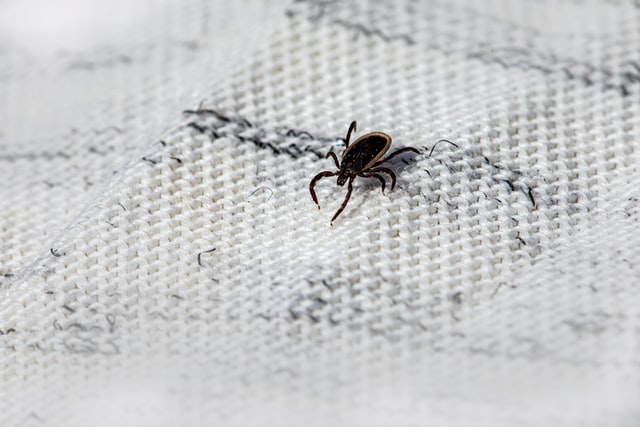
If you are not keen on applying chemical pesticides to your animal’s fur, you can try some safe and natural mixtures. For tick repellents intended for humans, you mix different essential oils. These are 20 drops of rose geranium, ten drops of sweetgrass, five drops of lavender, citronella, or lemon, and one tablespoon of rubbing alcohol. After mixing, dilute it with 100ml of water or vinegar. Shake well, and now you are ready to spray it on your clothes.
If you want to make a repellent for your pet:
- Mix 20 drops of pennyroyal and rose geranium oil and two tablespoons of almond oil.
- Before going outside, place a few drops on your dog, especially the collar.
- Just remember not to use it on cats and pregnant dogs.
🐜 Garden pests
Try mixing hot peppers, onion, or garlic to repel garden pests from crawling on your countertop. Blend it until the right consistency is achieved. Then, mix the paste with warm water and let it sit in a warm place for 24 hours. After that, strain it and spray it on your plants.
Another way to get rid of garden pests is to create a special repellant with tobacco. This is much more effective if your goal is to eradicate worms and caterpillars. Get one tobacco and put its content on a cup. Mix the tobacco contents with one gallon of water and leave it for 24 hours in a warm place. If the color becomes tea-like, you can now add liquid soap and spray on an infested plant.
But remember to avoid using this DIY pesticide on eggplants, tomatoes, or peppers.
🐜 Spiders
Add ten drops of peppermint oil and a cup of water. Mix it well, then add a quarter teaspoon of dish soap. Shake it well and spray on affected areas once a week until no spiders are seen. If you do not have available peppermint oil in your house, you can substitute it with citronella, lavender, eucalyptus, or tea tree oil.
🐜 Weevils
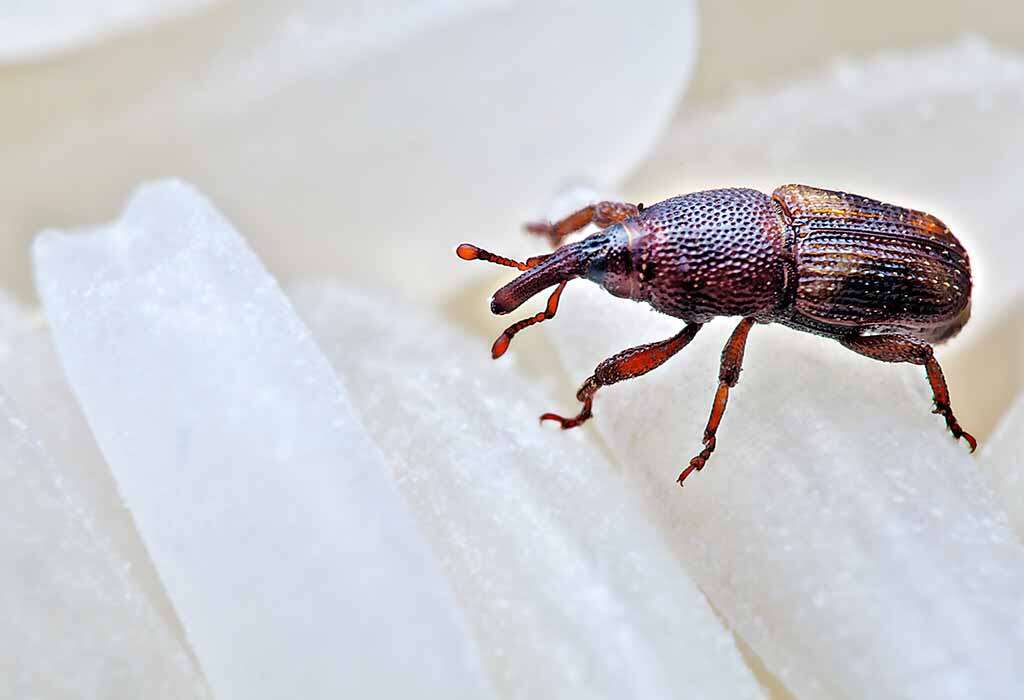
How to prevent weevils on your food? There is a trick that can be an excellent alternative solution. Weevils are believed to dislike the scent of cloves or bay leaves. Drop a bay leaf or a clove on top of your food and around their containers to keep them away from your countertop and pantry.
🐜 Dust mites
Even if you do not have allergic reactions due to dust mites, I am sure you still don’t want them swimming in your food, right? Mix 6 teaspoons of eucalyptus essential oil and a teaspoon of laundry detergent. Then, pour the mixture into a bucket of water. Soak your known washable items for an hour, then wash as usual. You can also put eucalyptus oil into your washing machine or a spray bottle. And if you don’t like the scent of eucalyptus, you can choose either lemon or tea tree oil.
SANITIZING AND CLEANING
Cleaning and sanitizing are not the same. Generally, cleaning uses water and soap to remove dirt and debris from surfaces, while sanitizing uses heat or chemicals to kill germs. Always remember that surfaces that look clean may still have germs that our naked eyes can’t see. Sanitizing reduces these germs to safer levels. After each use, food contact surfaces should be rinsed, washed, and sanitized to remove germs and other tiny bugs that can cause various illnesses.
✅ Sanitizers
Chemical-based sanitizers must be mixed following the manufacturer’s directions to avoid overconcentration that can lead to hazardous situations such as burns and explosions. Also, remember not to mix soap with these sanitizers. There are also sanitizers that have test strips to check if the solution is too weak or too strong. Change the solution often because dirt, grease, and food particles can make it less effective. Aside from these, you can also store wiping cloths in sanitizers to absorb the solution deeply.
✅ Cleaning by hands
If you are washing or cleaning by hand, all food-contact surfaces must also be rinsed and sanitized between uses. There is a proper procedure in washing sink, utensils, and dishes by hand. You first clean the sink, then scrape all the leftover food and throw it in the garbage. After cleaning the sink, wash the dishes in hot and soapy water, then rinse afterward. Always air dry the dishes and utensils because towels can breed bacteria if left wet.
And if your dishwasher is producing an unwanted smell, click HERE for the solution.
CLEANING THE KITCHEN COUNTER
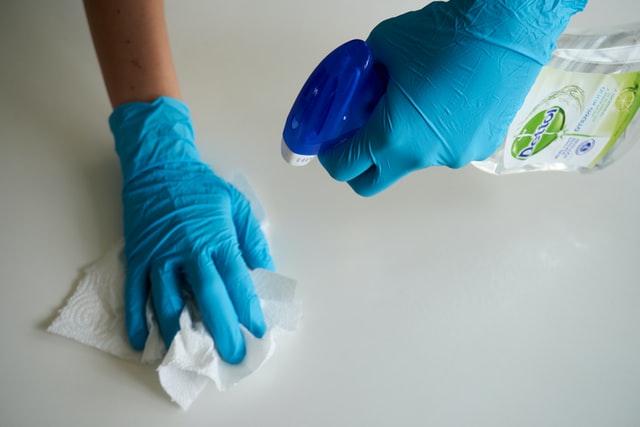
Cleaning the kitchen counter is something you must do just about every day. And before you start cleaning, you must know what type of material does your kitchen counter has. Is it granite, quartz, marble, laminate, cement, or tile? But regardless of the type you have, remember that counters don’t like abrasive materials, heat, and strong acid that will ruin their natural component.
✅ General tips
Always use a rack when anything hot comes out of the oven or stove. As mentioned, countertops don’t like heat, so you must use thick cloth or specialized racks for high-temperature pots. You must also wipe all the spills as soon as possible. This is because letting it sit for hours will allow the spill to set and become really difficult to remove. Some non-porous materials are impervious to stains. But still, why risk it?
Lastly, use the most basic and natural cleaner for daily care. But before that, you can inquire about getting a sealant for your countertop. This will prevent damages and stains to its original surface. Having countertop sealant will not give you a lifetime guarantee but will still protect your counter for years.
✅ Counter stains and scratches
Remember being panicked about a terrible stain setting in on your counters and the fear that stain is going to be a nightmare reminder of your lousy cooking skills? Don’t worry, and we can reverse this embarrassment! First, you must know that specific finishes will stain or scratch, and you can’t use anything acidic or abrasive on them.
That is why it is essential to know the type of counter you have and its specific maintenance directions. Any methods you use to remove stains must be tested in small corners so that no considerable damage can be seen if it doesn’t work for you.
For scratches, you can use a scoop of powdered detergent to a cup of warm water. Then put some directly on the blemish and cover it with plastic. Leave it for about 30 minutes maximum until the stain lifts off. After that, wipe everything away.
✅ Daily cleaning
It’s a good habit to keep a spray bottle filled with your countertop cleaner and wiping cloth around to create an exercise of wiping up after you use the kitchen. For anything with potential contaminants, such as your cat’s raw food, clean up using a disinfectant and leave it for the appropriate dwell time. Wipe it after using a paper towel so that you can toss it in the garbage and will not contaminate other areas.
✅ Hardcore cleaning
If you are planning to do a thorough cleaning, you must have a direction setup. This means that you must work clockwise while cleaning. Remove everything from the countertop, and you can work in sections to make the cleaning easier. Place your items on the counter area to your right or the table. Then, spray your countertop with your cleaner solution and let it sit for the right dwell time.
After the time, wipe your counter with a microfiber cloth using an S pattern and not in a circular motion. Don’t forget to remove left streaks and get down to eye level to check for spots, stains, and crumbs. After cleaning and wiping, place each item back to its original spot. Don’t forget to wipe each item over the floor or sink.
BOTTOM LINE
The most crucial kitchen principle to keep in mind is maintaining cleanliness around your home. It is so annoying when tiny black bugs crawl on your kitchen counter and don’t know where they came from. So, with the help of the lists mentioned above, you will now have ideas of what to do to remove these bugs. Just keep in mind to use natural methods and avoid chemical-based solutions, especially if you are treating areas where food may be seen.
If you found a big home of pests hiding in your kitchen, it is better to call pest control. Also, try not to stir up their colony because if you did, they will quickly scatter and escape after they sense a threat. So if you don’t want to deal with black bugs and kill nobody, contact the nearest pest control and let them do the work for you to avoid mess and damages.
